Symptoms of spider bites may include:
- redness and itching
- increasing pain
- nausea
- sweating.
Funnel-web and redback bites may cause other symptoms.
Funnel-web spiders
A funnel-web spider bite can be fatal. They live throughout Australia, including Queensland.
Have I been bitten?
If a funnel-web spider bites you, it can cause:
- local pain and swelling
- lots of saliva and tears
- muscle twitching
- difficulty breathing
- small hairs stand on end
- tingling around the mouth
- fast pulse and high blood pressure
- disorientation and confusion leading to unconsciousness.
Bites from other big black spiders such as the mouse spider may cause similar symptoms. Because it can be hard to tell the difference between big black spiders, you should treat the bite as a funnel-web spider bite.
How to treat funnel-web spider bites
If a funnel-web spider bites you, call Triple Zero (000). What you do next depends on where the bite is.
Leg bites
Call Triple Zero (000) and apply a bandage and splint. Make sure the bandage is comfortable, as it will need to be worn until a doctor removes it. Apply the bandage even if the person is already ill from the poison.
Keep the person’s whole body still and don’t remove their clothing. Moving them may cause more venom to enter the blood stream.
Apply the bandage and splint
Apply a broad pressure bandage over the bite site as soon as you can. Crepe bandages are best, but you can use any flexible material. For example, clothing or towels.
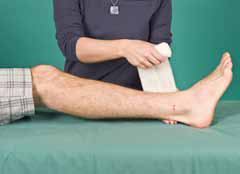
Bandage upwards from the lower part of the bitten leg. Wrap it firmly without stopping blood circulation. It should be as tight as you would apply to a sprained ankle.
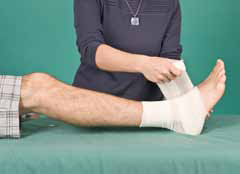
Wrap the bandage as high as possible up the leg.
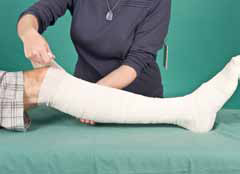
Apply a splint to the leg. You can use any stiff object as a splint, for example, a piece of wood or tree branch, or rolled up newspaper.
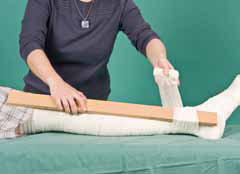
Bind it firmly to as much of the leg as possible.
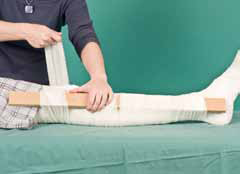
Lie them down to stop them from walking or moving around until the ambulance arrives.
Hand or forearm bites
Call Triple Zero (000) and apply a bandage and splint. Make sure the bandage is comfortable, as it will need to be worn until a doctor removes it. Apply the bandage even if the person is already ill from the poison.
Keep the person’s whole body still and don’t remove their clothing. Moving them may cause more venom to enter the blood stream.
- Bandage as much of their arm as possible, starting at the fingers.
- Apply a splint to their arm, any stiff object can be used as a splint, for example, a piece of wood or rolled up newspaper.
- Use a sling to stop the arm moving.
- Lie them down to stop them walking or moving around until the ambulance arrives.
Chest, abdomen, pelvis and back bites
Call Triple Zero (000) and apply firm pressure over the bitten area, if possible.
Don’t restrict chest movement and keep the person's whole body still until the ambulance arrives.
Head and neck bites
Call Triple Zero Triple Zero (000) and keep the person's whole body still until the ambulance arrives.
Don't apply any first aid to the bitten area.
Redback spiders
Redback spider bites often cause pain and in some cases more severe symptoms that need emergency care.
Have I been bitten?
If a redback spider bites you, it can cause:
- intense local pain which increases and spreads
- swollen glands
- patchy sweating
- vomiting
- headache
- small hairs stand on end
- muscle weakness or spasms.
How to treat redback spider bites
- Wash the area with soap and water and apply an antiseptic, if available
- Apply an icepack to reduce local pain and swelling
- Use pain relief if needed
- Use antihistamine to reduce swelling, redness and itch
Call us on 13 11 26 or see your doctor if you have severe pain that doesn't go away with painkillers or if you develop an infection.
Other spiders
Bites from other spiders can cause mild symptoms including redness, pain, and inflammation.
White-tail spiders aren't venomous to humans and are very unlikely to cause ulcers. Read about white-tail spider bites on the National Library of Medicine website.
How to treat other spider bites
- Wash the area with soap and water and apply an antiseptic, if available
- Apply an icepack to reduce local pain and swelling
- Use pain relief if needed
- Use an antihistamine to reduce swelling, redness and itch
Prevent spider bites
You can help prevent bites by:
- checking outdoor furniture, toys and cots for spiders, especially during warmer months
- mowing the lawn and clearing the rubbish
- teaching children to never touch spiders
- making sure you and your children wear appropriate shoes to avoid bites
- removing spider webs from your home
- getting a professional to remove any nests.